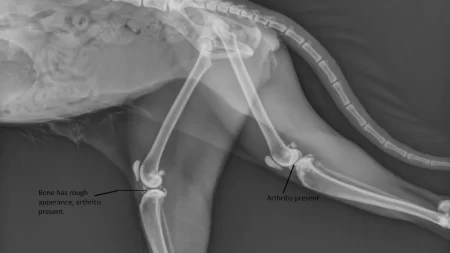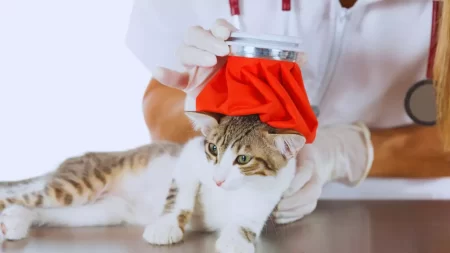Roundworms are primarily found in the small intestine of cats, where they feed on the contents of the gut. These intestinal parasites are one of the most common types found in cats.
Got a kitty and am curious if roundworms could be living in it. You’ve arrived at the perfect spot! Our piece is gonna give you all the facts you must know about where these parasites dwell inside cats and how to discover them. So stay with us and find out more about this significant topic!
Roundworms are a type of nematode, commonly found in cats and kittens. They affect cats of any age but are particularly prevalent in young, unvaccinated cats. Roundworms can cause poor growth, energy loss, and even death if left untreated.
Roundworms have a two-host life cycle, meaning they can infect both cats and humans. Adult females lay eggs in the host’s intestine that hatch into larvae. Depending on the type, these larvae move to other parts of the body before re-entering the gut to mature into adults.
Cats usually get roundworms from ingesting or coming into contact with contaminated feces, soil, or other animals. When ingested, eggs develop into larvae that migrate to the muscles, lungs, and other organs, before returning to the gut. Adult worms lay eggs that pass out in cat feces, which can still be infectious even if not visible.
Humans can accidentally ingest roundworm eggs, leading to larval stages that can cause blindness if not treated. Regular deworming is important to keep both cats and humans safe!
Life Cycle of Roundworms in Cats
Roundworms are parasites that can affect cats of all ages. Both indoor and outdoor environments can host these worms. Adult roundworms live in a cat’s small intestine, where they absorb nutrients and reproduce. Eggs produced by the adult worms are passed through the cat’s feces.
These eggs can remain dormant for months before hatching. They require moisture, warmth, and their preferred prey items to do so. After hatching, the larvae search for new hosts. Once inside, they make their way to the small intestine.
If the larvae successfully attach, they burrow into the mucosa of the wall. This can cause signs of diarrhea, vomiting, or poor nutrition. The adult worms lay eggs that accumulate on dry surfaces or feces-contaminated soil or plants. This continues the roundworm life cycle within cats.
Symptoms of Roundworm Infection in Cats
Toxocara cati, better known as roundworms, are a common parasite found in cats. These worms can cause serious health issues. Kittens can get them through their mother’s milk, or by eating an animal or insect that carries the larvae.
Cats may not show any signs of infection, but there are some symptoms. These include:
- Vomiting
- Diarrhea
- Fat belly
- Weight loss
- Dark circles near their tail or belly
- No appetite
If you think your cat has roundworms, it’s important to get them checked out by a vet. Treatment should start right away.
Treatment and Prevention of Roundworm Infection in Cats
Roundworm infections are a common intestinal parasite found in cats globally. These infections can be passed to humans and other animals, so early intervention is key! To treat these infections, a veterinarian will prescribe deworming medications that target both adult and immature forms of the roundworm. Examples include fenbendazole, milbemycin oxime, pyrantel pamoate, and piperazine citrate.
After the treatments are applied, it’s best to have a stool sample test done to make sure all worms are eliminated.
For prevention, keep the following in mind:
- Keep water bowls clean and practice good litter box hygiene.
- Bathe cats regularly, pick up after them outdoors, and clean any surfaces they lie on.
- Treat kittens two weeks old with deworms once more.
- Avoid contact with any infective materials, like animal feces, and use gloves when gardening outside – some soil may be infected.
- Freeze infected meat for 10 days before disposing of it or feeding pets.
Following these prevention methods will help keep roundworms from invading your cat’s body.
Common Types of Roundworms Found in Cats
Cats can get one or more of three types of roundworms: Toxocara cati, Toxascaris leonina, and Ancylostoma tubaeforme.
- Toxocara cati, also known as the “cat roundworm,” can grow up to two inches long. It is usually white or translucent. Cats mainly get it through nursing from an infected mom. They can also get it by eating an infected rodent.
- Toxascaris leonina is the “dog roundworm.” It can be up to nine inches long. It is tan or light yellow. Cats can get it by coming into contact with contaminated dirt or soil that has dog feces with eggs from this worm. Or if they eat a rodent, they can get both Toxocara cati and Toxascaris leonina.
- Ancylostoma tubaeforme, or the “hookworms,” can infect cats if they eat contaminated pork, beef, or soil with larvae on their skin. These worms are small (1-2 cm long), and feed on the cat’s blood inside their intestines. They can cause Anemia and Leptospirosis. Symptoms can include a lack of appetite/energy from Anemia or sluggishness from Leptospirosis.
How Cats Contract Roundworms
Roundworms are the most common parasites in cats. Easily contracted, these larvae can come from contaminated food or soil. Cats may also get them from eating an intermediate host such as a mouse or bird, or from pregnant cats passing them on to their kittens via milk.
Roundworm larvae can be spread between environments and then picked up by other animals or humans if they come into contact with infected soils or fecal matter containing eggs. So, cat owners should practice good hygiene when disposing of cat litter and use caution around outdoor areas that may have rodents or birds.
Regular deworming of cats is the best way to prevent infestations, but owners should still keep an eye out for signs of parasites, such as:
- Diarrhea
- Vomiting
- Weight loss
- Lethargy
- Pot-bellied appearance
Potential Complications of Roundworm Infection in Cats
Roundworms can cause trouble for cats. If not treated, kittens may suffer rapid weight loss, malnutrition, and bloating. The worms can also migrate to the lungs, causing respiratory stress. Severe cases may lead to pneumonia and endoparasitism. Anemia and spinal cord damage can also occur if left untreated. These can be fatal.
Conclusion
It’s essential to remember that roundworms can infect cats of any age! Therefore, adult cats should go to the vet for regular checkups. Keeping your kitty’s environment clean is always a smart move. If there’s an existing roundworm infestation, you should change the litter box often. Scheduling deworming treatments as well is a great idea.
These steps help protect cats from roundworms and other parasites:
- Regular checkups at the vet
- Keeping the environment clean
- Changing the litter box often
- Scheduling deworming treatments




![Where Do Roundworms Live In Cats? [Locating Roundworms] where do roundworms live in cats](https://justcatlover.com/wp-content/uploads/2023/02/where-do-roundworms-live-in-cats-1024x576.jpg)


